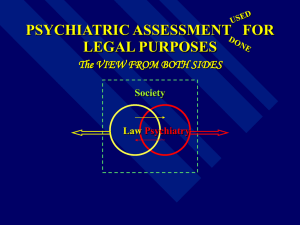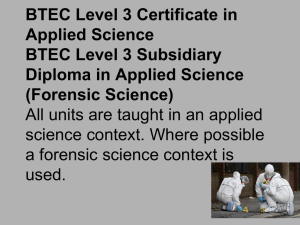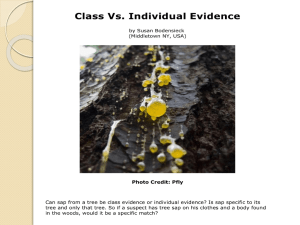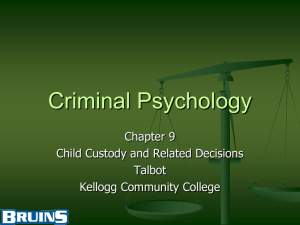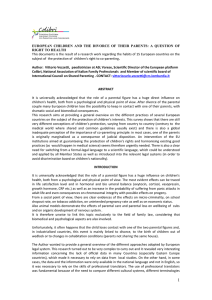custody evaluation by andrea ziegelman, esq. of moses
advertisement
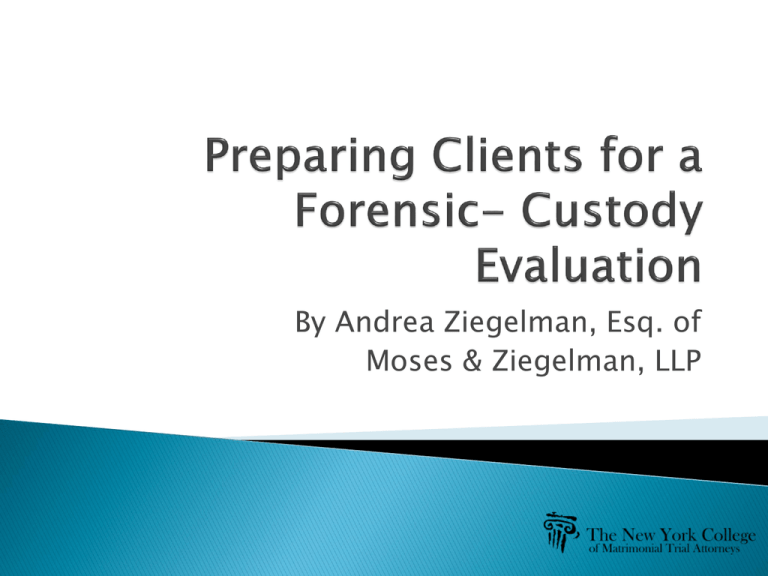
By Andrea Ziegelman, Esq. of Moses & Ziegelman, LLP I. Different kinds of forensic evaluations Psychological Evaluation Parental Fitness/Competency Evaluation Child Custody Evaluation II. Order of Appointment in Child Custody Evaluation Scope of Order of Appointment - what are the issues the evaluator is being asked to consider and evaluate and what are the issues in dispute in the litigation? (Decision-making authority, parental access, alcohol or drug dependency, mental illness, domestic violence, relocation, interference with parental access, etc.) The Order of Appointment in the context of the overall proceeding – prior custody motions, decisions (interim and/or final), statements made by Court both on and off the record, etc. Recommendations requested by Court regarding parental access, decisionmaking, etc. Documents and information provided to evaluator; when must the client and your office and opposing counsel exchange them; ensuring compliance with all aspects of the Order. III. Purpose and nature of forensic evaluation Provides Court with information about each child, each parent, parent-child relationship, and other relevant factors. Explain how the forensic evaluation is used by the Court to assist in its determination of the best interests of the child. IV. Explaining difference between forensic process and therapeutic process Forensic Evaluator is not providing “therapy” to party litigant. Waiver of Confidentiality. Forensic report, notes, testing – nothing is “off the record”. Custody disputes place client’s psychological functioning, medical and mental health condition squarely into issue. Ensuring client cooperation with requests by forensic evaluator for signing releases/providing requested information. Is it ever proper to object? Drug and other testing may be required/requested. V. Explaining generally the forensic process to the client: Individual parent interviews Information often elicited during evaluation from each litigant and of third parties/collaterals Parent-Child interviews (in-office and home visits) Parent-parent interviews (when it is improper/objectionable) Collateral interviews (typical collateral sources) Selection of collaterals by parent/ litigant Selection/requests for collateral interviews by forensic evaluator Psychological testing VI. Use of Mental Health Consultants Education and support; assistance in dealing with client anxiety and uncertainty during and about forensic process. Debate over recommending therapeutic or other interventions during evaluation (i.e. therapy, anger management, parenting classes). What is the underlying reason for it? When is it legitimate and when is it not? Debate over what is and what is not appropriate for consultant to do when working with parents/litigants. Consultant-client communications may be outside of the scope of protected work product and/or privilege. VII. What is acceptable and not acceptable for attorneys to do when preparing and counseling clients before and during custody evaluations Read literature. See paper presented by Jonathan W. Gould, Ph.D. for the 2013 Conference on Advanced Issues in Child Custody: Evaluation, Litigation, and Settlement. Wide differences of opinion in legal and mental health community on the appropriateness of preparing clients for evaluation. What is non-controversial: litigant/parent must tell the truth and be forthright – same guidelines apply to deposition and trial testimony, client affidavits, etc. Litigant/parent should not exaggerate or mislead evaluator, including in respect of parental strengths, involvement with various aspects of child’s life, other parent’s weaknesses, physical or emotional abuse, or any other issue. Lack of credibility will become apparent during third-party or children’s reports and clinical observations, as well as through submission of other evidence, including client’s cross examination during trial. o Credibility is enhanced where client can corroborate reporting of events, issues, etc. o Sources of corroboration – use of documents/parent e-mails and letters, affidavits, court transcripts, other records (i.e., school attendance records where lateness is an issue, medical records, attendance at child-related events; neuropsychological evaluations and IEP evaluations where parental involvement is noted, etc.); use of collateral third-party sources/interviews, including teachers, doctors, children’s therapists, parents’ therapists, nannies, other (preferably unbiased) third-parties familiar with individual family members, including children, over extended period. o Opposing counsel may seek to use at trial unfavorable or contradictory statements made by, or about, your client during forensic process. Presentation of clear, cogent picture of parenting ability; parent-child relationship; involvement of parent in care of, and decisions relating to, child. Collection of concrete and focused examples to illustrate points and important themes. Staying on track, being focused, offering pertinent information – what are the most important “themes” to get across to evaluator? Being responsive to evaluator’s inquiries and questions. o Current professional debate over assisting parents in presenting and redefining issues, identifying and/or paring down examples of parenting, parentchild interactions, etc. Ability to present fair and balanced assessment of one’s parental strengths and weaknesses and other parent’s strengths and weaknesses. Avoidance of bad-mouthing of other parent during evaluation versus giving examples of behaviors of other parent that have materially impacted child in a negative way or interfered with client’s access to, or relationship with, child. See AFCC Task Force’s identification of 17 acceptable practices in connection with preparing parents for custody evaluations. See pages 28-29 of paper presented by Jonathan W. Gould, Ph.D. for the 2013 Conference on Advanced Issues in Child Custody: Evaluation, Litigation, and Settlement. Understanding child’s developmental needs; educational, physical, and emotional needs; special needs, if any, of child and how such needs affect client’s parenting and ability to co-parent. Inappropriateness of coaching client. Debate over what constitutes coaching versus appropriate preparation. Inappropriateness of rehearsing answers and preparation for psychological testing
